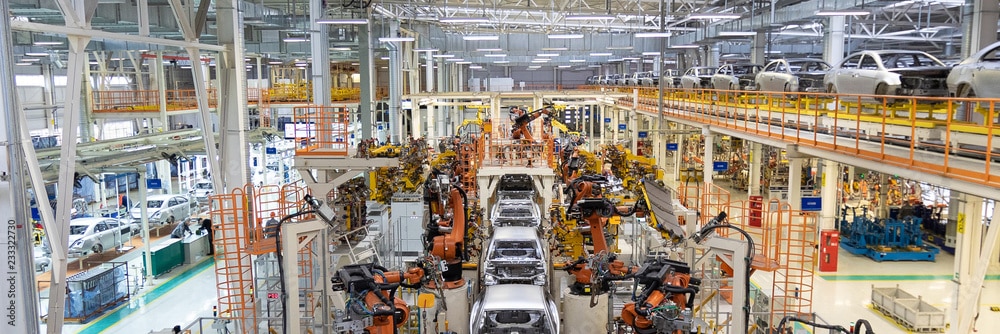Each year, the key players in the automotive industry gather for the Southern Automotive Conference (SAC), where representatives from original equipment manufacturers (OEMs), top-level suppliers, supply chain experts, and more from around the world gather to share learnings, discuss trends, and explore the latest technological enhancements available to auto manufacturers.
Whether you have a role in producing vehicle components, plant construction, transportation, logistics, quality control, accounting, or any other of the various complexities involved, the SAC is the place to be if your business has anything to do with the automotive industry.
But if you couldn’t make it out to the conference in Biloxi, Mississippi this past October, don’t worry – Capstone has you covered. We were on-site to absorb all of the energy and learnings, as well as to share how Capstone can help OEMs and suppliers unlock their full potential with our innovative warehousing and logistics solutions.
Here is a recap of the top three industry trends discussed at the 16th annual Southern Automotive Conference this year.
Supply Chain Issues Continue
The world has been eager to move past the Covid-19 pandemic, but supply chains are still recovering from the damage it caused. And some of the changes made to accommodate business and customer needs at the time appear to be here to stay.
The cost of doing business is no longer the single most pressing factor on the minds of OEMs and their suppliers. Peter Ricchiuti, Professor of Business at Tulane University, explained in his keynote address: “Now you’re looking for cost and resilience: can I get ahold of those products, and are they going to be there for me?”
For many businesses, one solution to that problem is moving operations closer to home to simplify their supply chain and avoid costly import fees and shipment delays. In addition, OEMs and suppliers are also opting to keep higher levels of inventory on hand – which we can infer means a higher demand for more warehouse space.

Keynote speaker Joseph McCabe, President and CEO of AutoForecast Solutons, LLC, suggested that suppliers prepare to address these supply chain trends head on with predictive inventory management. “The supplier that is successful is the proactive supplier,” McCabe advised, going on to say that those who can look to the future to predict the wants and needs of OEMs will succeed in establishing a growing presence in the auto manufacturing ecosystem.
These needs are driving more auto manufacturers to construct integrated logistics centers (ILCs) adjacent to their assembly plants. Utilizing ILCs to maintain a constant flow of parts and equipment to and from the assembly room floor, companies can stabilize and speed up production timelines.
The Future Is Electric – Or Is It?
The major trend in automotive manufacturing these past few years has of course been electric vehicles (EVs). And of course, we continue to see growth in that space, thanks in large part to a new, more emotional and socially-driven buyer giving voice to industry disruptors like Tesla and Rivian.
Don’t throw out your internal combustion engine (ICE) blueprints just yet, though. There is evidence that some of the issues with EV production – including higher costs and a lack of existing infrastructure to support these vehicles long-term – may keep manufacturers from closing the door completely on legacy vehicles, at least for now.
In his keynote address, Joseph McCabe went so far as to say “We are never killing the internal combustion engine,” and he went on to explain that despite the growing push for electric and hybrid vehicles, almost 50% of all vehicles being manufactured still need internal combustion engines to function.
Changing Business, Changing Workforce
Labor issues have plagued many automotive manufacturers in recent years, as the Covid-19 outbreak stirred a demand for increased pay, better benefits, and more flexible schedules. And the need for up-skilled labor only grows as technologies evolve and auto manufacturers continue to expand their footprint in the South.
While Capstone was on the ground at the SAC acting as a sponsor and exhibitor, we engaged with a lot of OEMs and suppliers. These leaders expressed a strong interest in an alternative approach to warehousing that offers greater flexibility than traditional third-party logistics (3PL) models without sacrificing expertise or experience.
Capstone Logistics provides full-service or customized warehousing solutions to OEMs and suppliers to help improve their operations and reduce employee churn. Capstone has extensive experience working with automotive manufacturers and unique expertise in managing ILCs.
Our unique warehouse management model offers the right balance of flexibility and control to keep operations running smoothly through any turbulence or change. And with our “guest in your house” hybrid warehousing model, you retain as much control over your operations as you choose while offloading tedious, timely, and high-cost aspects of the business.
Hybrid warehouse management may be just what you need to help future-proof your business and improve your warehouse operations. In one instance, Capstone helped a major automotive manufacturer achieve a 55% year-over-year reduction in workforce turnover and a 48% increase in units processed per shift. To learn more, read the case study.
Looking Ahead With Forward Mobility
The theme for this year’s SAC was “Forward Mobility”, and the points punctuating every keynote, panel, and conversation were progress and growth.
Whether we’re talking about the pandemic-spurred changes to traditional supply chains, the drive toward electric and hybrid vehicles fueled by a new kind of customer behind the wheel, or the workforce challenges that are leading more and more automotive industry players to look to third parties for help managing their warehouses and operations, it’s clear that the automotive industry can look forward to even greater expansion and evolution in the coming year.
With all that growth, you’re going to need a partner you can rely on to keep your warehouse operations running smoothly. Schedule a free consultation to learn what Capstone can do for you.

